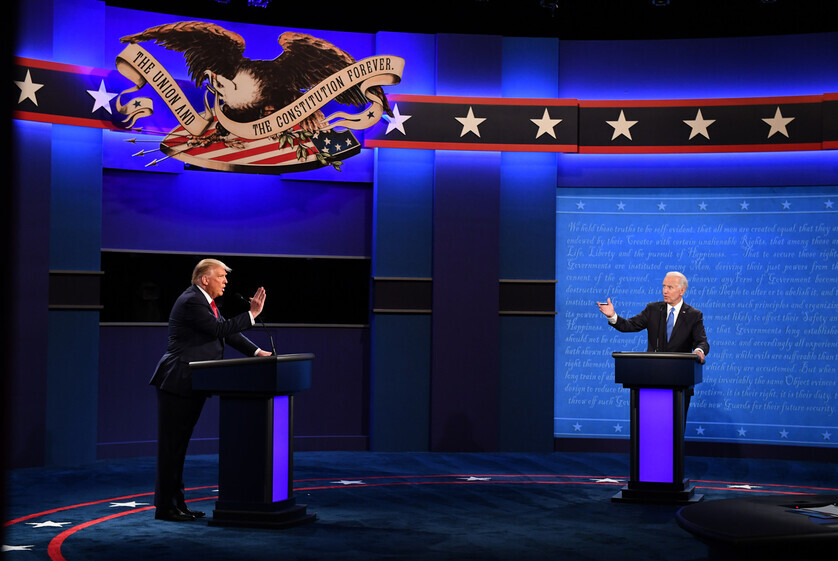hankyoreh
Links to other country sites 다른 나라 사이트 링크
[News analysis] S. Korea faces economic uncertainty no matter who wins US presidential election

With the US presidential election just a week away, South Koreans are wondering how the election results will impact their economy. If US President Donald Trump, the candidate for the Republican Party, is reelected, he’s expected to continue his trade dispute with China, creating more uncertainty for the Korean trade environment. If Democratic candidate Joe Biden wins the election, he’s likely to implement tougher environmental regulations, which would also require a response from Korea.
Analysts at public and private research institutions told the Hankyoreh on Oct. 26 that the adversarial relationship between the US and China will probably continue regardless of who is elected president. Biden and Trump both believe that the rise of China threatens the US’ national security and that China’s unfair trade practices need to be corrected. No matter who wins, therefore, Korea’s trade environment will face increasing uncertainty.
In terms of policy execution, one difference between the two candidates is that Trump pursues American unilateralism, while Biden advocates multilateralism, emphasizing cooperation with American allies. In a report comparing Biden and Trump’s trade platforms, the Korea International Trade Association noted that while the Trump administration’s trade conflict with China has been bilateral, a Biden administration would widen that front by bringing American allies into the conflict.
Trump is likely to continue imposing tariffs on Chinese goods and banning imports of Huawei as part of the conflict over 5G tech standards. Biden might rejoin the Trans-Pacific Partnership, a trade agreement from which Trump withdrew.
“Given Korea’s high dependence on China for its exports, change is inevitable for the global value chain in Northeast Asia no matter who wins the election. It’s only a matter of how quickly those changes occur. Since Biden ascribes to multilateralism and abiding by international norms, a Biden administration could buy us more time to prepare for those changes,” said Song Yeong-gwan, an analyst with the Korea Development Institute (KDI).
If reelected, Trump is expected to maintain and strengthen his current policy of protectionism and his “America first” brand of economic nationalism. That was the conclusion of a report in which the Korea Institute for Industrial Economics and Trade (KIET) offered projections for the 2020 election and its impact on Korea’s trade environment.
KIET analysts predicted that Trump, in a second term, might drop out of the World Trade Organization or adopt even tougher protectionist measures under Section 301 of the Trade Act (which authorizes retaliation against unfair trade practices) and Section 232 of the Trade Expansion Act (which authorizes limiting import volume and raising tariffs for trade security). But they added that since various countries have already figured out the Trump administration’s negotiating strategy, the Korean economy probably won’t suffer as serious a shock as it did at the beginning of Trump’s first term.
“Under a Biden presidency, the US and China could deescalate their tariff war, and an equilibrium might form at a lower level compared to the tough action Trump has been taking. Biden’s multilateralism is likely to work in Korea’s favor,” said Ju Won, chief economic analyst at the Hyundai Research Institute.
Biden has stressed eco-friendly policies and promised to impose a carbon tax on energy usage that involves carbon emissions by 2025. In light of that, trade agreements negotiated by the Biden administration could also include tougher labor and environmental standards. That could place a burden on Korea, which has been slow to take action on climate change.
“The Democratic Party’s traditional ‘big government’ approach leads to tougher business regulations. To some extent, that could have a negative impact on Korean exports,” said Jeong Gyu-cheol, head of economic projections at the KDI.
By Lee Kyung-mi, staff reporter
Please direct comments or questions to [english@hani.co.kr]

Editorial・opinion
![[Guest essay] Preventing Korean Peninsula from becoming front line of new cold war [Guest essay] Preventing Korean Peninsula from becoming front line of new cold war](https://flexible.img.hani.co.kr/flexible/normal/500/300/imgdb/original/2024/0507/7217150679227807.jpg) [Guest essay] Preventing Korean Peninsula from becoming front line of new cold war
[Guest essay] Preventing Korean Peninsula from becoming front line of new cold war![[Column] The state is back — but is it in business? [Column] The state is back — but is it in business?](https://flexible.img.hani.co.kr/flexible/normal/500/300/imgdb/original/2024/0506/8217149564092725.jpg) [Column] The state is back — but is it in business?
[Column] The state is back — but is it in business?- [Column] Life on our Trisolaris
- [Editorial] Penalties for airing allegations against Korea’s first lady endanger free press
- [Editorial] Yoon must halt procurement of SM-3 interceptor missiles
- [Guest essay] Maybe Korea’s rapid population decline is an opportunity, not a crisis
- [Column] Can Yoon steer diplomacy with Russia, China back on track?
- [Column] Season 2 of special prosecutor probe may be coming to Korea soon
- [Column] Park Geun-hye déjà vu in Yoon Suk-yeol
- [Editorial] New weight of N. Korea’s nuclear threats makes dialogue all the more urgent
Most viewed articles
- 1Behind-the-times gender change regulations leave trans Koreans in the lurch
- 2Yoon’s revival of civil affairs senior secretary criticized as shield against judicial scrutiny
- 3South Korean ambassador attends Putin’s inauguration as US and others boycott
- 4Family that exposed military cover-up of loved one’s death reflect on Marine’s death
- 5Hybe-Ador dispute shines light on pervasive issues behind K-pop’s tidy facade
- 6[Guest essay] Preventing Korean Peninsula from becoming front line of new cold war
- 7[Editorial] New weight of N. Korea’s nuclear threats makes dialogue all the more urgent
- 8‘Weddingflation’ breaks the bank for Korean couples-to-be
- 9Yoon’s broken-compass diplomacy is steering Korea into serving US, Japanese interests
- 10U.S. band that performed in N. Korea looking forward to going back